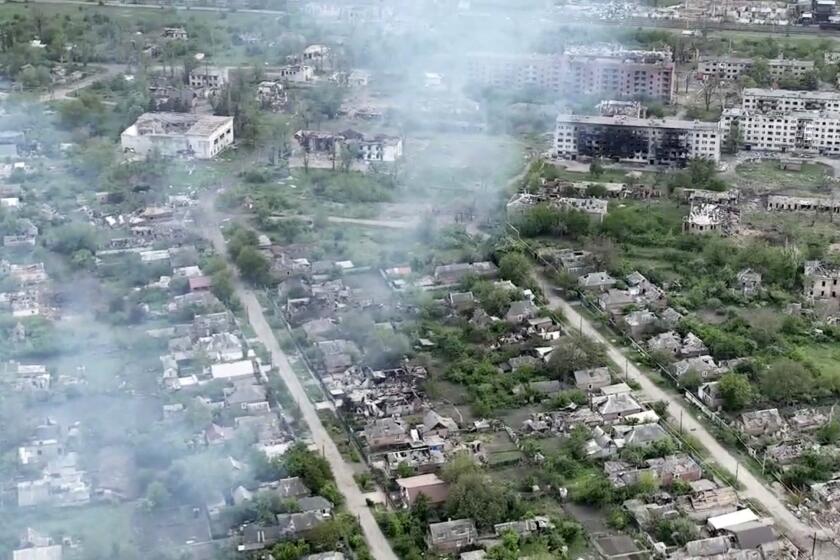Snuffing Radical Islam’s Fire
Just as Saddam Hussein was a handy punching bag for U.S. fury over Osama bin Laden, Yasser Arafat had, long before his death, become a convenient scapegoat for failures in Western diplomacy over the 50-year-old Palestinian tragedy. We just don’t get it, and we better soon.
The relationship between the Palestinians and the rise of Al Qaeda, between Arafat and the rise of Israeli Prime Minister Ariel Sharon, needs to be deconstructed. Our whole “war on terror” (and of terror) will continue to be quixotic, if not self-destructive, if we don’t take the opportunity of the Palestinian Authority president’s death to set a new course, not based on a personality but on history and the needs of the region. At least a pinch of the salt of our own ideals in the soup of the Mideast wouldn’t hurt either. And I don’t mean force-fed “democracy.”
I met Arafat in Beirut on the brink of the Israeli invasion of Lebanon in 1982, the event Bin Laden referred to -- with portent few caught -- in his missive to the West just before the U.S. presidential election.
I didn’t know it at the time, but I was following in the footsteps of my father-in-law, Robert Rogers, who was the first major network reporter (NBC) to interview Arafat. He was also the first network documentary producer to openly criticize the Vietnam War (“It’s a Mad, Mad War,” 1964), a courageous trait I’d like to see more of today.
That afternoon in a crowded Beirut hovel, with U.S.-made Israeli warplanes overhead, Arafat seemed to offer hope for pluralistic coexistence when he reminded journalists of St. Peter’s trip to Rome: “He did not capture Rome, but he captured the hearts of the people of Rome. This is the meaning of the terra sancta. This is the lesson of history. And one more time, sooner or later, we will give another lesson for the history.”
I am not naive about Arafat. He was corrupt, and under his watch, if not his direction, extremists did horrid things. In this, he was little different from those leaders who sullied their records and their souls with the King David Hotel, My Lai, Irangate and Abu Ghraib, not to mention Sabra and Shatila. But what struck me that day in Beirut was Arafat’s admission that the hot war on his doorsteps was lost. That, to him, was a given and a smaller matter. His message was remarkably spiritual for a head of state, or state in waiting, and presumed the moral tradition of the Holy Land (terra sancta).
Far from being the unregenerate terrorist described by those who put Israel’s interests above all other concerns, Arafat never went back on his 16-year-old historic acceptance of Israel nor his belief in peaceful coexistence with Israelis. The devil, of course, is in the details of the settlement, and the one offered by Ehud Barak in 2000 -- touted as the “deal of the century” -- left the vast majority of Israeli settlements intact and cut the West Bank into a Swiss cheese of cantons with huge bypass highways to the settlements, patrolled by Israeli tanks. Even in the days of Jim Crow America, blacks could walk on the public roads. These roads in occupied Palestine are forbidden to Arabs, the vast majority of the people who live there. If this is freedom, one commentator noted, it is freedom unlike any freedom in the world.
Unnerving as he could be, Arafat was not the devil that Israel-firsters made him out to be, but probably the best Palestinian that Israel had going for it, certainly when compared with Hamas (or with the Saudi, Bin Laden, a man Arafat chastised as cynically appropriating the Palestinian cause). Yitzhak Rabin understood this. One part of the Israeli soul knew this; otherwise Mossad would have done in Arafat years ago. The other part, however, the Likud part -- unprepared to make minimum concessions to Palestinians, such as giving up the settlements and East Jerusalem and allowing some semblance of a right of return -- had to make Arafat out to be the devil incarnate. As journalist I.F. Stone once said, “There is something in the Israeli soul that prefers the Arab extremist to the Arab moderate.” You don’t have to concede anything to extremists.
The key issue now for Israel is not how to force, or cajole, Palestinians into accepting the stale roses of an old “deal.” The key for Israel is making the concessions necessary to new Palestinian leaders that will give them incentive to crack down on Hamas and Islamic Jihad -- to strengthen the middle.
The key for the United States, which faces a far more dangerous force in Bin Laden and his minions, is to finally grasp the centrality of the Palestinian cause to the phenomenon of Bin Laden. The U.S. has to disengage itself in concrete ways from the fact that it funds a messianic state in the Middle East, Greater Israel, whose current leaders believe they have a God-given right to land that was acquired by war. This state has made the very heart of the Arab world in Palestine suffer for half a century, on our dime.
There are those who say that President Bush also sees the region primarily in religious terms, as ground zero for an imminent, God-ordained Rapture. If so, there is no reason left in American foreign policy. Let us hope for something better from our leaders than an apocalyptic fantasy that plays into Bin Laden’s hands -- and that the country founded on the Enlightenment and separation of church and state prevails, not some kook West Bank settler or suicide bomber.
In October, one of the 9/11 commissioners, John Lehman, spoke at Pitzer College at a conference on the subject of 9/11 and the writer’s imagination and conscience. He acknowledged that evil would not disappear from the Earth if the Palestinian-Israeli conflict were settled. But, wouldn’t a whole lot of the oxygen be drained from Bin Laden’s recruitment message if it were? Lehman agreed emphatically. Snuffing the “oxygen” of terror was the right metaphor, he said.
Go for it, President Bush. Save a lot of money and lives and sanity. You don’t have to capture Bin Laden. Just make him quaint.
More to Read
Start your day right
Sign up for Essential California for news, features and recommendations from the L.A. Times and beyond in your inbox six days a week.
You may occasionally receive promotional content from the Los Angeles Times.






